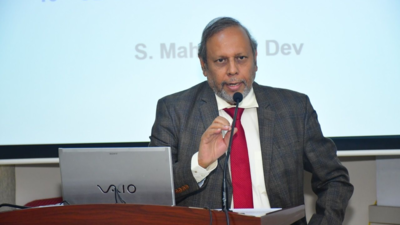ARTICLE AD BOX

Mahendra Dev, chairman EAC-PM (Image credits: X @MahendraDevS)
India should negotiate the proposed India-US trade agreement on its own terms, keeping national interest in focus, said S Mahendra Dev, chairman of the economic advisory council to the Prime Minister (EAC-PM).
He believes that India stands to benefit from lower tariffs and increased exports once Free Trade Agreements (FTAs) are finalised."The overall approach of India is negotiating trade agreements with countries on its own terms and keeping in view the national interests. The negotiations are going on and the ultimate decision depends on the mutual interests of both countries," Dev told PTI.His remarks come as India and the US hold the fifth round of talks on a proposed Bilateral Trade Agreement (BTA) in Washington.
India has taken a firm stand on the US demand for duty concessions on agricultural and dairy products. So far, India has not given any such concessions in the dairy sector under any FTA.India is also seeking the removal of additional tariffs on its exports, including 26 per cent on certain goods, and easing of high US tariffs on steel and aluminium (50 per cent) and automobiles (25 per cent). India has retained the right to impose retaliatory duties under World Trade Organisation (WTO) norms.
US President Donald Trump recently said that the proposed deal with India would be similar to the one signed with Indonesia. Under that agreement, Indonesia gave full market access to US goods, while its exports face a 19 per cent duty in America. Indonesia also agreed to purchase $15 billion in US energy, $4.5 billion in agricultural products, and 50 Boeing aircraft.On the economic front, Dev said there is no need to change India’s current inflation target as the present system is working well as reported by PTI.Since 2016, India has followed a flexible inflation targeting (IT) framework with the Reserve Bank of India (RBI) aiming to keep inflation at 4 per cent, within a 2–6 per cent band."It may be noted that higher inflation hurts the poor and middle class mostly. Low inflation is also important for sustainable growth," he said.Dev also supported continuing the Fiscal Responsibility and Budget Management (FRBM) targets to ensure sound fiscal management and warned that a higher fiscal deficit would increase inflation, raise interest payments, and reduce funds for development.
"A higher fiscal deficit will increase inflation and hurt growth," reported PTI quoting Dev.He noted that the government has managed to reduce the fiscal deficit from 9.2 per cent of GDP in FY21 to 4.8 per cent in FY25, with a target of 4.4 per cent for FY26, and is sticking to its fiscal consolidation roadmap despite growing demands.
PLI driving growth and jobs
On the Production Linked Incentive (PLI) scheme, Dev said its full impact goes beyond just the targeted sectors, as it also benefits non-PLI industries due to interlinkages."PLI incentives, along with FTAs with other countries, should attract FDI and enhance exports," Dev said as quoted by PTI.The chairman further cited studies showing that while direct value addition in electronics declined, indirect value addition rose, reflecting stronger links with upstream industries. The government is now focusing on increasing domestic value addition, cutting import content, and creating more jobs by boosting local manufacturing under the PLI scheme.The government introduced the PLI scheme across 14 sectors to promote domestic manufacturing, ramp up production, generate employment, and boost exports. The core objective of the scheme is to make Indian manufacturing globally competitive by reducing import dependence and increasing local value addition.Instead of a uniform model, the PLI scheme follows a sector-specific strategy tailored to the needs of each industry.
Electronics exports and FDI rise
In the electronics sector, the focus is on strengthening assembly operations and supporting the domestic manufacturing ecosystem. Today, India ranks among the top assemblers and exporters of mobile phones.Back in FY15, imported mobile phones made up 78 per cent of the market by value, but this dropped sharply to just 4 per cent by FY23. “A similar trend can be seen in exports, with the electronics and renewable energy sectors witnessing a significant rise in FDI inflows,” Dev noted.



.png)
.png)
.png)
















 2 days ago
8
2 days ago
8









 English (US) ·
English (US) ·